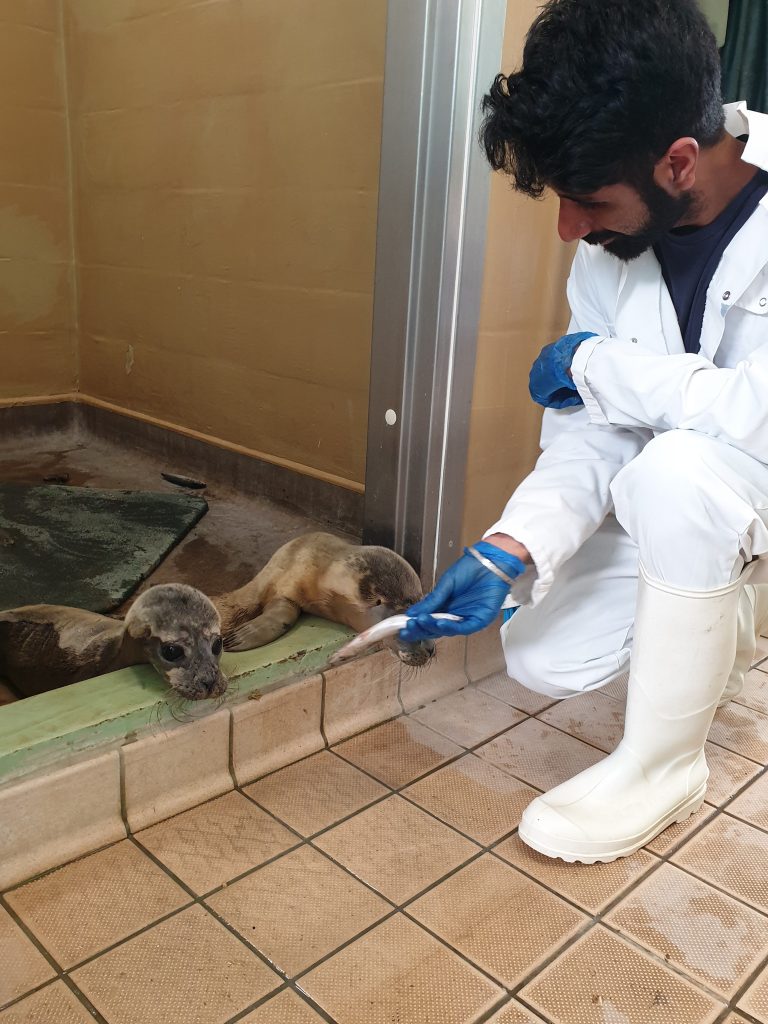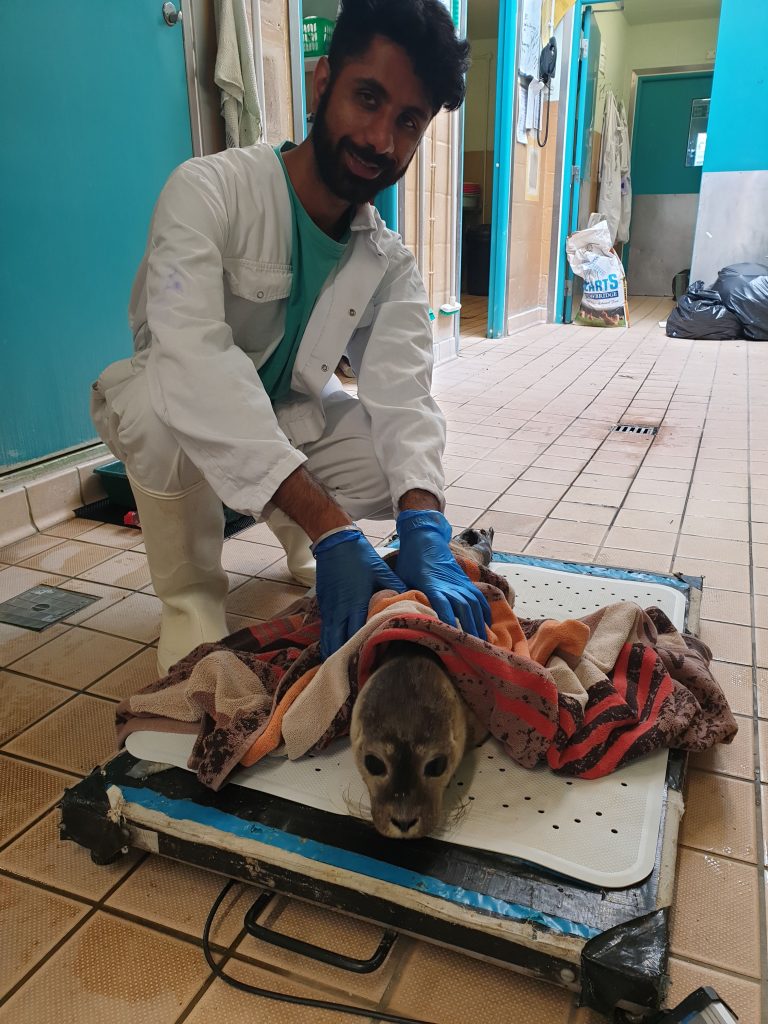Seals From Space
28 November 2019
The Norwegian archipelago of Svalbard lies deep inside the Arctic Circle. Nestled between glacial features and vast expanses of tundra, its few bright lights represent the northern frontier of civilisation.
On the western coast of these frozen islands sits the tiny settlement of Ny-Ålesund, a former mining town now home to one of the most diverse scientific communities on Earth. It hosts researchers representing ten nations – and in September, their number was bolstered by Prem Gill (BSc 2017).
Conducting science from space
Having graduated with a degree in Marine Geography, the polar conservationist works with the World Wildlife Fund (WWF), the British Antarctic Survey and the Scott-Polar Research Institute to map local animal populations. He was in the region in preparation for a planned trip to the Antarctic.
“I wanted the experience of conducting polar field work in an inaccessible, inhospitable region,” says Prem. “But more than that, I went out to the North Pole to see the state of the situation.”
His work currently focuses on monitoring seals. Why? “Well, Antarctic seals are a great indicator for the health of the Antarctic ecosystem,” explains Prem. “They are the largest consumers of Antarctic krill, which have no shortage of predators. The krill themselves are heavily reliant on sea ice.”
“Monitoring krill is difficult,” he adds. “But by day, the Antarctic Seals are just chilling out on the ice. If you can track them and the changes in their population you can to some extent ascertain the abundance of krill, and in turn assess changes to the polar environment.”
Prem leads a project known as Seals from Space – and as the moniker suggests, his trip to the Arctic represented a dramatic change in working environment. His work relies heavily on assessing satellite imagery from his base in Cambridge.
“In the last fifteen years, satellite data has rapidly increased: not just in availability but in resolution. You can get imagery from anywhere in the world at 30cm, which means that if you left your laptop out there then you would stand a good chance of finding it. So, you see the seals and even blood on the ice if one has just given birth.”
The process of manually counting seal populations is often laborious – and one that Prem is hoping to automate using artificial intelligence. “If you spend hours going through an image of sea ice and you find no seals, it’s one of the most soul-destroying processes known to man.”
Changing perceptions and breaking down barriers
So, what drives him? Beyond the immediate importance of his research, Prem is passionate about widening access to the field.
“When you hear the words Antarctic explorer, you might not be imagining a young, brown person,” he says. “You might be imagining sepia-toned photos of white, Victorian people. I wanted to change that. To say that an explorer, or a conservationist, actually looks a lot like me.”
As well as boosting participation in under-represented communities, Prem is acutely aware of the barriers to entering his field. He is intent on breaking them down.
“If you want to get a foot in conservation, you need experience,” he says. “In other STEM subjects, you’ll be paid for an internship. Conservation is different. Not only will you not be paid, you sometimes have to pay charities for the privilege of working with them.”
Having completed his own undergraduate degree only two years ago, Prem is setting up internships and shadowing schemes for others to gain first-hand experience of the field. One placement will see a STEM undergraduate from an underrepresented background join him on the Seals from Space project.
The canary in the climate coalmine
He believes that the presence of relatable voices is critical in waking the world up to the dangers of climate change.
“Ordinary people have got immediate threats in their lives: to their incomes, to their livelihoods, to X, Y, Z. But who’s raising issues to do with climate awareness? Who are the people trying to make it seem like an urgent thing? It’s a very specific group.”
“When that’s the case,” says Prem. “It’s probably natural to think it’s an issue for someone else.”
Having seen the effects of climate change for himself, he knows it to be a serious threat – and one that is prevailing in our lifetimes. “The polar regions are like the canary in the coalmine,” he explains. “They’re the first place you see the effects of climate change occurring.”
The melting of the ice fields does not serve simply as a warning. Their role in the global ecosystem is to regulate the temperatures of oceans all over the world, as well as contain the water that could lead to a catastrophic rise in global sea levels.
“My experience in the North Pole was a real eye-opener in terms of how the landscape has changed,” Prem says. “We were being told ‘you know, there was a glacier that used to extend across this fjord ten years ago and now it’s all the way over here’.”
He freely admits that experience opened his eyes.
“Even as a climate conservationist, I struggle to see the impact of climate change in the UK,” he admits. “But if you go the Arctic, it’s not gradual. It’s only when those effects hit home that we’re going to realise what’s going on.”

- January 2026
- November 2025
- September 2025
- July 2025
- June 2025
- May 2025
- April 2025
- March 2025
- February 2025
- January 2025
- October 2024
- September 2024
- August 2024
- July 2024
- June 2024
- May 2024
- April 2024
- March 2024
- February 2024
- January 2024
- December 2023
- November 2023
- October 2023
- September 2023
- August 2023
- July 2023
- June 2023
- May 2023
- April 2023
- March 2023
- February 2023
- January 2023
- November 2022
- October 2022
- September 2022
- August 2022
- July 2022
- June 2022
- May 2022
- April 2022
- March 2022
- February 2022
- January 2022
- December 2021
- November 2021
- October 2021
- September 2021
- August 2021
- July 2021
- June 2021
- May 2021
- April 2021
- March 2021
- February 2021
- January 2021
- December 2020
- November 2020
- October 2020
- September 2020
- August 2020
- July 2020
- June 2020
- May 2020
- April 2020
- March 2020
- January 2020
- December 2019
- November 2019
- October 2019
- September 2019
- August 2019
- July 2019
- May 2019
- April 2019
- March 2019
- February 2019
- January 2019
- December 2018
- November 2018
- October 2018
- September 2018
- August 2018
- July 2018
- June 2018
- May 2018
- April 2018
- March 2018
- February 2018
- December 2017
- November 2017
- October 2017
- September 2017
- August 2017
- July 2017
- June 2017
- May 2017
- April 2017
- March 2017
- February 2017
- January 2017
- November 2016
- October 2016
- September 2016
- July 2016
- June 2016
- May 2016
- April 2016
- March 2016
- February 2016
- January 2016
- December 2015
- November 2015
- October 2015
- September 2015
- August 2015
- January 2015
- December 2014
- November 2014
- September 2014
- August 2014
- May 2014

